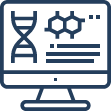The information on this website is intended for healthcare professionals.
Are you a healthcare professional?
*Presentation of possible signs and symptoms may vary. See signs and symptoms for a more complete list.
Menkes disease is a genetic disorder that happens when a specific gene, called ATP7A, does not work correctly.1 Children born with Menkes disease have decreased absorption of copper, which affects a variety of functions dependent on copper throughout the body.1,4











Diagnosis of Menkes disease requires increased attention to possible signs and symptoms followed by appropriate laboratory tests and/or genetic testing by your child’s doctor4:








Download our Menkes Disease Patient Conversation Guide for more information on the tests used to diagnose Menkes disease.
There are currently no approved treatments for patients with Menkes disease. Supportive care can help patients have better quality of life and manage symptoms.1 For information on clinical trials, please visit clinicaltrials.gov.


If a family member has been diagnosed with or is suspected of having Menkes disease, learn how to find a Menkes disease treatment center near you:
The following websites can provide you with more information about Menkes disease and its treatment:
Get connected with other caregivers, families, and healthcare professionals caring for a child with Menkes disease by joining or starting your own support group at:
Advocate for Menkes disease to be included in standardized newborn screening panels so that diagnosis can be made earlier. You can also contact your local representative or start a petition for your state. Visit the following resources to learn how you can get involved:
If you spot possible signs and symptoms of Menkes disease, talk to your child’s doctor and ask about different testing options, including copper, ceruloplasmin, biochemical, and genetic tests. To learn how to recognize the signs and symptoms of Menkes disease, visit our Signs and Symptoms page and download our Menkes disease conversation guide.
Talk to your child’s doctor about connecting with the appropriate care team for your child and finding a Menkes disease expert near you. See more information about Menkes disease, current clinical trials at clinicaltrials.gov and where you can find a Menkes disease treatment center.
Support groups are available through social media sites and through the Menkes Foundation. Connect with others to share your story about living with rare diseases at RareDiseaseDay.org or check out other available groups.
The most recent clinical research can be found at the National Organization for Rare Disorders or the Genetic and Rare Diseases Information Center. If you’d like to directly receive updates on new treatment advancements, sign up to receive informational emails.
Download our Menkes Disease Patient Conversation Brochure for a guide to discussing Menkes disease with your child’s doctor
DownloadReceive information about government programs, potential advancements, advocacy opportunities, and ways to find additional resources that can help you and your family learn more about and manage a diagnosis of Menkes disease.
The information on this website is intended for healthcare professionals.
Are you a healthcare professional?